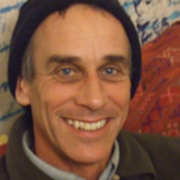
Shane Loader
After editing a run of documentary projects, Shane Loader has crossed into directing feature-length dramas. Working with partner Andrea Bosshard, he co-directed movies Taking the Waewae Express and Hook, Line and Sinker.
Shane Loader’s path to filmmaking began when a friend took him to a film society screening, deep in the bowels of Wellington’s old National Museum. The film was in German, and for some reason there were no subtitles to help non-German speakers along. Many would have snuck quietly home; but Loader was hooked.
He began making films in the 1980s, often alongside his partner Andrea Bosshard. In the mid 80s they worked together on a number of experimental Super 8 films, as part of a group which included future producer Martin Long and Oscar-nominated special effects man Matt Aitken (Super 8 is a type of 8mm film which began replacing the old 8mm format in the 1960s).
In 1988 Loader and Bosshard joined with Haunui Royal to make the 70-minute In Our Own Time - Unemployed Respond to Unemployment. The documentary was made for national unemployed worker organisation Te Roopu Rawakore o Aotearoa.
The same year Loader and Bosshard were invited to join the team of documentary filmmakers at Wellington's Vanguard Films. The Vanguard team often help out on one another’s projects. Loader had worked alongside Vanguard co-founder Alister Barry on previous shoots; he went on to edit and help shoot a number of Barry’s documentary projects, including acclaimed Rogernomics critique Someone Else’s Country (1996), and follow-up In a Land of Plenty. Loader also took on the triple roles of cameraman, sound recordist and editor on Russell Campbell’s Sedition, about the imprisonment of conscientious objectors during WWII.
Loader and Bosshard’s own Vanguard work includes 50-minute abortion documentary Backroom Troubles, which uses interviews to reveal how New Zealand women handled unwanted pregnancies in the days before abortion was legalised. Loader produced, edited and helped film it. Backroom Troubles has had many screenings at medical schools and conferences.
In 1994 Loader directed The Terrorist, which was selected to compete at the prestigious Clermont-Ferrand short film festival. Running at just under half an hour, the film explores the psyche and motivation of a left-wing terrorist (Rebecca Rodden).
Later he edited (with director and teacher Li Tao) feature-length doco Waves (2006), which chronicles the experiences of four Chinese students studying at a New Zealand high school.
In 2008 Bosshard and Loader launched Torchlight Films. Inspired partly by the naturalistic films of British director Mike Leigh and the Danish-born Dogme movement, the pair developed a low-budget filmmaking model in which scripts are developed in collaboration with actors; the intention being to make local stories that “are contemporary, multi-cultural, cross-generational and which address the issues which affect us all’.
The first Torchlight feature was Taking the Waewae Express (2008). Listener critic Helene Wong called it "a beautifully understated but emotionally strong look at the effect of death on a group of young friends". The NZ Herald's Peter Calder praised the "smart script which eschews both cheap dramatics and easy payoffs".
Torchlight followed it with Hook, Line and Sinker, starring Waewae’s Rangimoana Taylor as a longtime truck-driver whose life threatens to go off the rails, after an eye test provides unwelcome news. The cast also features Geraldine Brophy (Second-Hand Wedding) and Carmel McGlone (Marching Girls). Dominion Post critic Graeme Tuckett praised the film’s performances and "beautifully pitched script", calling the result "likeable, admirable and hugely enjoyable".
The pair's third feature The Great Maiden's Blush was released in May 2016. This time the story was built around two people from very different backgrounds: a girl-racer in prison for manslaughter (Hope and Wire's Miriama McDowell), who plans to adopt out her baby, and a failed classical pianist (Renee Lyons) whose own baby is due to have a risky operation. This time Loader handed over camera duties to veterans Alun Bollinger and Waka Attewell. "The directors make the most of the limitations," wrote Listener reviewer James Robins, "proving that care and dedication are worth far more than any blank cheque". Maiden's Blush went on to win the award for Best Self-Funded Film at the 2017 NZ Film Awards.
Loader and Bosshard went on to co-direct feature-length documentary Kobi, about Bosshard's father, Swiss-Kiwi jeweller Kobi Bosshard.
When directing together on set, Loader concentrates on shots and how the film will cut together, while Bosshard tends to work with the actors. The duo chose to distribute both features themselves, feeling that the established model of releasing films leaves the distributor earning too high a cut of box office returns. Traitionally, transferring a digitally-shot feature onto a 35mm format which could screen in mainstream cinemas was too expensive for low-budget filmmakers. But Bosshard and Loader argue that even in the time between Waewae and Hook, Line and Sinker, the rapid spread of digital projection in cinemas — plus advances in digital technology — resulted in many more screening opportunities for their work.
Loader taught screen acting at the yearly National Youth Drama School from 1998 to 2009; he wrote, directed and edited many short films in the process.
Profile updated on 15 October 2021
Sources include
Shane Loader
Andrea Bosshard
Torchlight Films website. Accessed 15 October 2021
James Robins, 'The Great Maiden's Blush - review' - The Listener, 23 May 2016 (broken link)
Helene Wong, ‘Hook, Line & Sinker directed by Andrea Bosshard & Shane Loader’ (Review) - The Listener, 25 April 2011, Issue 3703